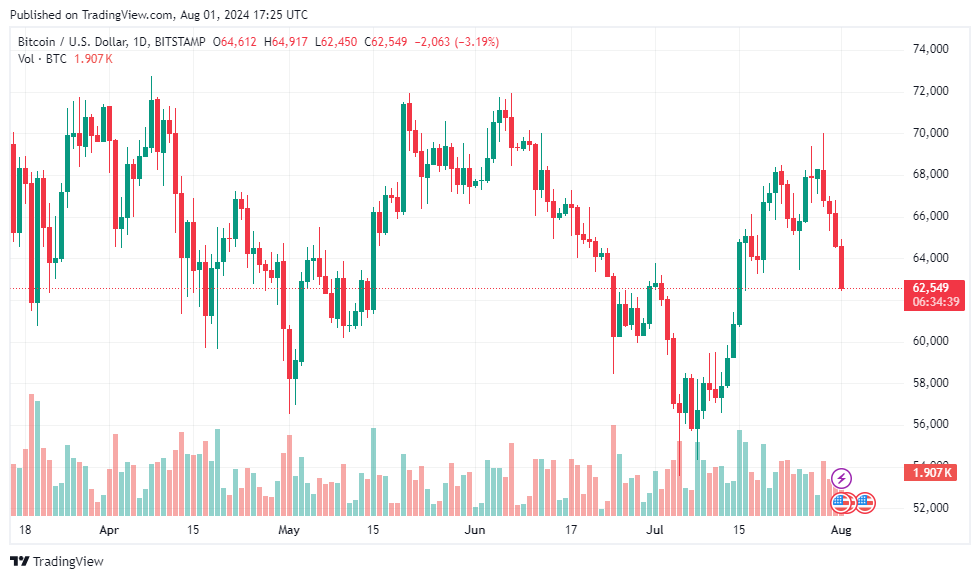As a result of rising cyber crimes, crypto hackers robbed $266 million in crypto assets in July alone from 16 different cyber attacks across decentralized and centralized crypto platforms. Notably, this number represents a 51% surge compared to the previous month, much higher than the $176 million recorded in June.
WazirX, India’s leading crypto exchange, is at the top of the list of hacks, accounting for 86.4% of the total crypto lost last month. Allegedly targeted by the North Korean hacker group known as Lazarus, WazirX lost $230 million in digital assets due to the exploit.
Hackers Still Hold Stolen Funds of WazirX
On July 18, cybercriminals exploited vulnerabilities in the WazirX exchange’s wallet, stealing funds from users’ assets on the platform. After examining the hack’s patterns and techniques, the firm attributed it to the Lazarus Group, the North Korean hackers’ group. Pecksheild, a blockchain security and investigation firm, disclosed that 61,151 Ethers stolen in the breach are still under the hackers’ control as of August 1.
#PeckShieldAlert July 2024 witnessed 16 hacks in the crypto space, resulting in ~$266 million (w/o Compound Potential Governance Attack)) in losses.
Top 10 Hacks:#WazirX: $230 million (CeFi)#Compound: $24 million (Potential Governance Attack)#LI.FI: $9.73 million#Bittensor:… pic.twitter.com/jsmP9qLuqR
— PeckShieldAlert (@PeckShieldAlert) August 1, 2024
Other significant hacks in Defi protocols include a $24 million theft in Compound Finance, an Algorithm protocol, and a $11 million theft in Li.Fi, a bridging protocol. Bittsensor and the DeFI liquidity provider Rho Market are other victim firms, each losing $8 million. Collectively, these protocols suffered losses of more than $50 million in crypto assets.
In most incidents, cybercriminals moved the looted funds to Tornado Cash. Tornado Cash is an EMV-compatible privacy solution provider platform. The platform allows deposits from a single address but enables withdrawals from a different address. It facilitates bad actors to restrict the process of tracing money on the blockchain network.

Terra Losses $6 Million of Users
The infamous Terra Blockchain also underwent a cyber hack in the same month. This incident drained $6 million in multiple crypto tokens. Following the breach, Terra suspended on-chain withdrawals at 11,430,400 block height.
Cyvers Alerts, a Web3 security firm, disclosed that hackers bypassed Terra’s known vulnerabilities in the network that caused previous hacks. It enabled exploiters to rob 60 million ASTRO, 500,000 USDT, 3.5 million USDT and 2.7 BTC within a few hours of the hack. As a result, ASTRO plummeted 60% following the news.
#PeckShieldAlert #slippage $ASTRO Astroport has dropped -60%https://t.co/PtDpHon3kp pic.twitter.com/65Ayl9Wz3j
— PeckShieldAlert (@PeckShieldAlert) July 31, 2024
On the same day, Terra developers completed an emergency upgrade on the Terra network before resuming the block production.
While speaking on the theft, Terra noted in a statement:
Validators holding over 67% of the voting power on Terra have upgraded their nodes to prevent the exploit from recurring. More validators are expected to upgrade soon.
However, Deddy Lavid, the co-founder and CEO of Cyvers, said that centralized exchanges are subject to higher risks from crypto hacks by cybercriminals in 2024. He added that smart contract-based projects are more vulnerable to cyberattacks because negligence in the code of smart contracts creates weak points in the network, helping hackers invade easily.
On the other hand, the number of crypto hacks recorded in June was comparatively lower than in July. June witnessed losses of $176 million in crypto hacks from 20 incidents. As the digital asset industry evolves, scams and hacks also thrive. Defi protocols and centralized payment firms must integrate robust technology to protect user funds. Safeguarding crypto users will foster the growth and innovation of the digital asset landscape.





